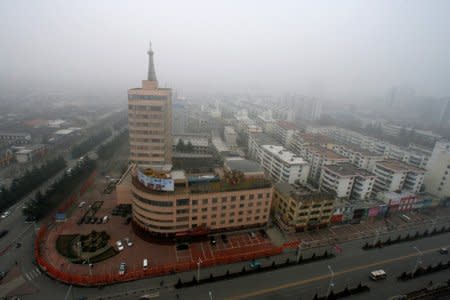Beijing spared as smog triggers curbs on factories across northern China

Thomson Reuters
BEIJING (Reuters) - Smog warnings across northern China have forced authorities to order factories to reduce output, construction sites to slow work, and the enforcement of limits on the use of diesel-fueled vehicles on Thursday.
The capital Beijing was the only city among 28 being monitored where air quality hadn't become bad enough to trigger the order given on Thursday, according to the research center overseeing the campaign against pollution for the Ministry of Environmental Protection.
The smog was expected to dissipate on Saturday, the research center said on its official Wechat account.
The city of Taiyuan in Shanxi province had the highest pollution reading, with the concentration of hazardous breathable particles, known as PM2.5, at 344 micrograms per cubic meter on Thursday evening.
The World Health Organization recommends concentrations of no more than 10 micrograms, while China should aim to meet its own "interim" standard of 35 micrograms by 2035, China's Minister of Environmental Protection said in October.
Beijing's PM2.5 level was 72 micrograms o Thursday evening.
China has launched a major effort to clean the north's notoriously toxic air during the winter when smog blankets colder regions as people crank up their heating.
The central government has ordered the 28 cities to reduce emissions of PM2.5 by at least 15 percent from October to March 2018.
But Beijing has started to roll-back some aspects of the campaign including allowing regions that have not converted to gas or electric heating to burn coal or other fuels instead.
Eight of the 28 cities failed to meet air quality targets in October and November, though the data also show that in November average PM2.5 levels across the 28 urban areas dropped by 22.6 percent from the year-ago period to 65 micrograms per cubic meter.
(Reporting by Elias Glenn; Editing by Simon Cameron-Moore)
See Also:

 Yahoo News
Yahoo News 
